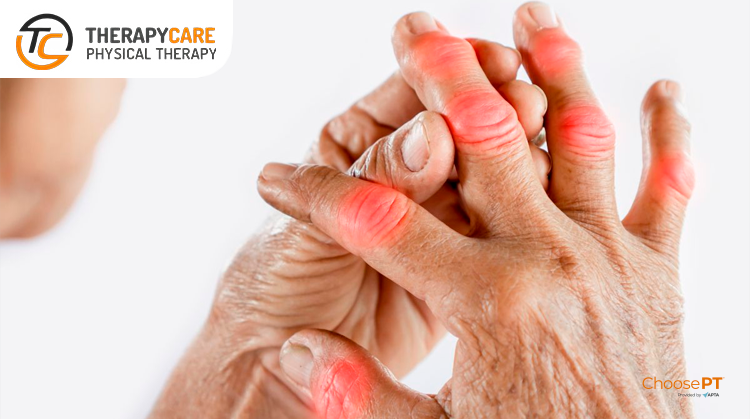Physical Therapy Guide to Rheumatoid Arthritis

What Is Rheumatoid Arthritis?
RA is an autoimmune disease — a condition where the body’s immune system attacks its own tissues. It affects the soft tissues around joints. Fluid builds up in the affected joints, causing pain, stiffness, and inflammation. The exact cause of RA is unknown. RA may be related to a combination of genetics and environmental or hormonal factors.
Women are more likely to develop the disease and are diagnosed with RA three times more often than men. Although RA may begin at any age, most research suggests it usually occurs in midlife.
How Does It Feel?
RA symptoms can flare up and then quiet down (go into remission). Research shows that early diagnosis and treatment is important for easing symptoms and flare-ups.
People with RA may experience:
- Stiff joints that feel worse in the morning.
- Painful and swollen joints on both sides of the body. Symptoms often start with smaller joints like those in the fingers. Over time, larger joints, such as knees and ankles, also can be affected.
- Bouts of fatigue and general discomfort.
- Low-grade fever.
- Loss of joint function or range of motion (movement).
- Redness, warmth, and tenderness in the joint areas.
How Is It Diagnosed?
A physical therapist may be the first to recognize symptoms of the onset of RA, such as joint stiffness. The physical therapist will refer people with suspected symptoms to a specialist, like a rheumatologist, for further tests. Factors that help the rheumatologist determine a diagnosis of RA include:
- Inflammation around the joints.
- The number of joints involved.
- Specific blood test results.
How Can a Physical Therapist Help?
Physical therapists play a vital role in helping people with RA improve and maintain function. Your physical therapist will work with you to develop a treatment plan to help address your specific needs and goals, and keep you moving well. Physical therapists understand how bones, joints, and muscles work together. They can help you get your body back on track.
Because the signs and symptoms of RA can vary, the approach to your care also will vary. What works for you may not work for others. Your physical therapist will design a treatment plan to meet your needs and may:
- Provide advice and encouragement on how to improve your general fitness with regular exercise. As with many conditions, education is key to building and keeping good health.
- Design a personal exercise plan to improve your joint flexibility and muscle strength.
- Help you develop energy-saving measures to improve your daily functions at home and work.
- Suggest short-term, pain-relief methods, such as gentle heat and electrical stimulation.
Can This Injury or Condition Be Prevented?
The causes of RA are not fully understood. There is no sure way to predict or prevent the onset of RA. However, early detection of symptoms will help you and your health care providers better manage your RA. Addressing your RA as soon as you notice symptoms (e.g., morning stiffness, painful and swollen joints) may add to your long-term well-being.
When diagnosed, your physical therapist will work with you to develop ways to help you understand and manage your symptoms. Above all, it is vital to keep moving. Increasing your activity levels and staying active will help you improve your function and enjoy a better quality of life.
What Kind of Physical Therapist Do I Need?
All physical therapists are prepared through education and experience to treat conditions, such as RA. However, when seeking a provider, you may want to consider:
- A physical therapist who is a board-certified clinical specialist or who completed a residency or fellowship in geriatric or orthopaedic physical therapy. This PT has advanced knowledge, experience, and skills that may apply to your condition.
- A physical therapist with experience treating people with RA or other systemic inflammatory disorders.
You can find physical therapists in your area who have these and other credentials by using Find a PT, the online tool built by the American Physical Therapy Association.
General tips when you’re looking for a physical therapist (or any other health care provider):
- Get recommendations from family, friends, or other health care providers.
- When you contact a physical therapy clinic for an appointment, ask about their PTs’ experience in helping people with painful conditions, such as RA.
- Be prepared to describe your symptoms in as much detail as possible. Keeping a journal to show when you experience pain will help the PT identify the best style for your care.
